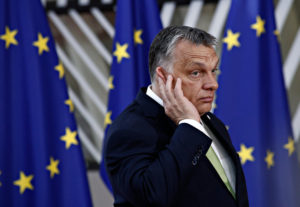

January 2019, Volume 30, Issue 1
Illiberal Democracy and the Struggle on the Right
At present, the key struggle for the future of liberal democracy appears as if it will be unfolding among parties and thinkers on the right.
755 Results


January 2019, Volume 30, Issue 1
At present, the key struggle for the future of liberal democracy appears as if it will be unfolding among parties and thinkers on the right.


October 2019, Volume 30, Issue 4
Amid mass protests, the personalist autocracy of longtime Sudanese president Omar al-Bashir fell to an April 2019 coup. With the country now being governed by a council composed of both opposition leaders and powerful security-service coupmakers, prospects for democratization remain uncertain.


October 2024, Volume 35, Issue 4
The People’s Republic of China has entered a new age, abandoning the ideological openness of the reform era and the socialist legacy of the revolutionary period. Under Xi Jinping, regime stability trumps all — and the PRC is weaker and less stable as a result.

January 2012, Volume 23, Issue 1
Morocco was not immune to the 2011 upheavals in the Arab world, but the country’s monarchy deftly managed the crisis through cosmetic constitutional reform.

April 2008, Volume 19, Issue 2
In Africa today, investment flows in and civil societies grow stronger, yet many of the continent's leaders continue to behave autocratically, defending their privileges against the spread of law-based rule.


April 2022, Volume 33, Issue 2
Why are authoritarian regimes championing gender equality? Modern dictators want to appear progressive, liberal, and democratic, while distracting from their worst abuses.
October 2020, Volume 31, Issue 4
Hyperlocalized U.S. policing both upholds and corrodes democratic principles. Although some aspects of Europe’s model are nonstarters in the United States, Americans crave centralized enforcement of rules against abusive policing.
July 2019, Volume 30, Issue 3
The norm of ballot secrecy, although widely accepted in principle, is often downplayed and loosely defined in practice. As policy makers weigh new electoral options such as postal and internet voting, a better understanding is needed of secrecy’s many aspects and requirements.
July 2018, Volume 29, Issue 3
When nonviolent mass protests occur under authoritarian regimes, the military plays a key role in determining the outcome: the hardening of the dictatorship, a new authoritarian regime, or a transition to democracy.
April 2018, Volume 29, Issue 2
In 2017, the state of political rights and civil liberties around the world sunk to its lowest point in more than a decade. While the democratic powers grappled with their own internal problems, leading autocrats expanded their global efforts to undermine democratic institutions.
April 2017, Volume 28, Issue 2
This small West African country voted a longtime dictator out of the presidency. This victory for democracy was seemingly snatched away by his refusal to leave power—yet a breathtaking reversal lay in store.
October 2015, Volume 26, Issue 4
Once widely celebrated, civil society today is regarded as a threat by many governments, leading them to restrict its funding and activities.
July 2015, Volume 26, Issue 3
Nonpartisan election monitoring has helped to foster democratization over the last thirty years, but now dictators are trying to sabotage it, often by spreading lies and confusion.
July 2015, Volume 26, Issue 3
It is fine to acknowledge the importance of law-based rule to the eventual rise of modern democracy, but we must not overlook the even greater contribution of the idea of equality.
April 2015, Volume 26, Issue 2
China has gone back on its well-documented vow (and solemn treaty obligation) to allow Hong Kong genuine universal suffrage. Abrogated commitments and fake democracy are not the path to a thriving Hong Kong that feels at home within the People’s Republic of China.
January 2015, Volume 26, Issue 1
As China’s power grows, will it seek to remake the world in its authoritarian image? For now, China shows no such missionary impulse, but the ways in which it pursues its interests can still threaten the fate of democracy.
January 2014, Volume 25, Issue 1
January 2014 marks the tenth anniversary of Afghanistan’s constitution. In what areas has it succeeded or failed? Judging by its achievements with respect to four midrange goals, the document has a record that is decidedly mixed.
January 2013, Volume 24, Issue 1
Despite the considerable resilience demonstrated by the Chinese authoritarian regime, its power experiences continuous atrophy. With the weakening of the totalitarian control imposed on Chinese society, the current stability-maintenance system has been decreasing in its effectiveness.
January 2012, Volume 23, Issue 1
Read the full essay here. In the West, Turkey is considered a model for a secular democracy in the Muslim world, yet the country finds itself mired in a crisis of civil rights and liberties under a third term of the pro-Islamic AKP government. Ironically, while the government maintains a discourse on political reform—including constitutional…
April 2011, Volume 22, Issue 2
Even before Argentina’s landmark gay-marriage law was passed in July 2010, a gay-rights revolution was well underway across Latin America. But do gay rights by law equal acceptance of gays in practice?